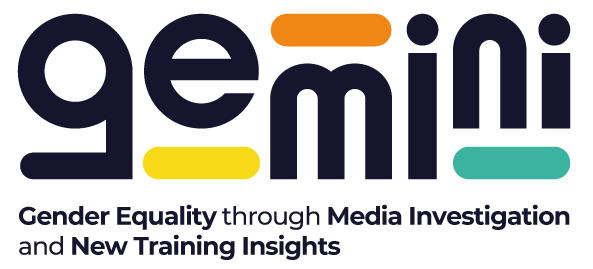Target groups
GEMINI addresses 6 different target groups, which consist of 1) European young adults, 2) high school teachers, 3) scholars in the SSH, 4) professionals in the CCI (Cultural and Creative Industries), 5) policy makers, and 6) the general public.
You may read more about the target groups below.
European young adults are represented by high school students, citizens aged between 14 and 18, being in a training phase, also oriented to human values and transversal skills, such as the ones concerning gender equality. Through the GEMINI project and, in particular, through the focus groups (WP3) and the phase of training and piloting (WP4) we intend to increase the awareness of young generations regarding gender equality, with a specific focus on the importance of the representation of diversity in media narratives.
At the end of the project, this target group will have suitable tools that allow the young adults to recognise the representation of gender stereotypes and of negative gender roles. The long-term effect we intend to create is changing their approach and behavior towards specific groups of the population as well as becoming drivers of change, since they diffuse positive messages (being also able to use suitable communication tools, such as audio-visual channels) and, in doing this, make sure that they feel valued and empowered with no negative feelings regarding their specific conditions.
High school teachers have the responsibility of promoting gender equality and diversity as values, integrating a gender equality approach in all the curricular and extracurricular activities. In order to do so, they need to know their students’ perception of issues related to gender identity and to understand the role of popular culture, and particularly serial drama, as powerful and innovative educational resources to promote gender equality.
Through the GEMINI Educational Toolkit addressed to the teachers, as well as through the knowledge acquired from the analysis of how serial drama represent gender identities and raise awareness about gender equality topics in young generations, high school teachers will be provided with new skills, innovative learning materials and practical tools to be able to address gender equality and diversity issues in their curricular and extracurricular activities.
The long-term effect we intend to implement is to integrate such approaches within a wide range of educational activities, thus creating a positive atmosphere of openness and collaboration regarding gender equality.
The third target group consists of European scholars specialised in gender and media studies (Humanities/Social Sciences), and scholars in the field of education. Indeed, promoting a European culture based on the idea of gender equality requires a continuing interplay of data and ideas, which could be achieved by overcoming the boundaries between countries and disciplines. To this purpose, the GEMINI project – especially in its WP3 and WP6 – aims at creating an interdisciplinary European community composed of scholars who adopt distinct yet interacting disciplinary approaches within the fields of gender and media studies (audio-visual studies, production studies, sociological studies, audiences studies, religious studies, etc.) and different socio-cultural areas, in order to collect data, analyse them in a comparative perspective, disseminate the researches’ results inside the academic community, and share them in the public debate, suggest strategic policies to institutions and media producers.
GEMINI also wants to foster the exchange between scholars, professionals in the CCI, and policy makers about the topics of gender equality and diversity. Thanks to the comparative research conducted in WP3, the project will provide European executives and creatives (producers, commissioners, directors, screenwriters) as well as supranational, national, and regional funding bodies, and programmes in the audio-visual sector with new insights about how young European audiences perceive the representation of gender identities and diversity in most popular TV series.
These new insights will be offered in form of recommendations to improve existing guidelines and create new strategies to tackle stereotypes and promote gender equality in television storytelling. From a long-term perspective, the establishment of the International Observatory on Gender Equality and Diversity in Media Narratives is explicitly designed to carry on future activities of data collection and data analysis about gender equality in audio-visual media and continue fostering the exchange between scholars, professionals, and policy makers.
Concerning specifically policymakers, GEMINI aims at producing an impact at the level of national policies also fostering the understanding of the urgency and willingness to take action at local, regional, and national level. At a continental level, the project will produce guidelines and recommendations that will be based on an innovative educative method for communicating gender equality based on the development of a critical awareness linked to the dominant gender representation models.
The general public is the European citizens whose opinions, attitudes and behaviors the EU aims to develop toward a model based on a wide idea of “gender balance”. As the EU Gender Strategy 2020-2025 points out, in fact, at least gender equality consists of equal treatment in legislation, gender mainstreaming (integration of the gender perspective into all European policies), and specific measures for the advancement of women, and from this point of view the EU has made significant progress over the last decades.
However, the EU effort has not often been matched by the rise of European citizens’ awareness with the consequence that a) gender stereotypes and inequalities still exist, and b) a different “gender culture” characterises the different EU Member States to such an extent that it is necessary to speak about “Europe” in a plural form.
To this purpose, the GEMINI project aims at: a) arising/reinforcing the European public awareness in respect of the gender equality issue (short/medium term impact), both involving young adults and their trainers/teachers in licensing the educational toolkit and in the screen contest, and sharing best and worst practices thanks to an intensive communication activity both through mainstream channels and in the digital ones; b) turning European citizens into the first ambassadors of gender equality best practices.


